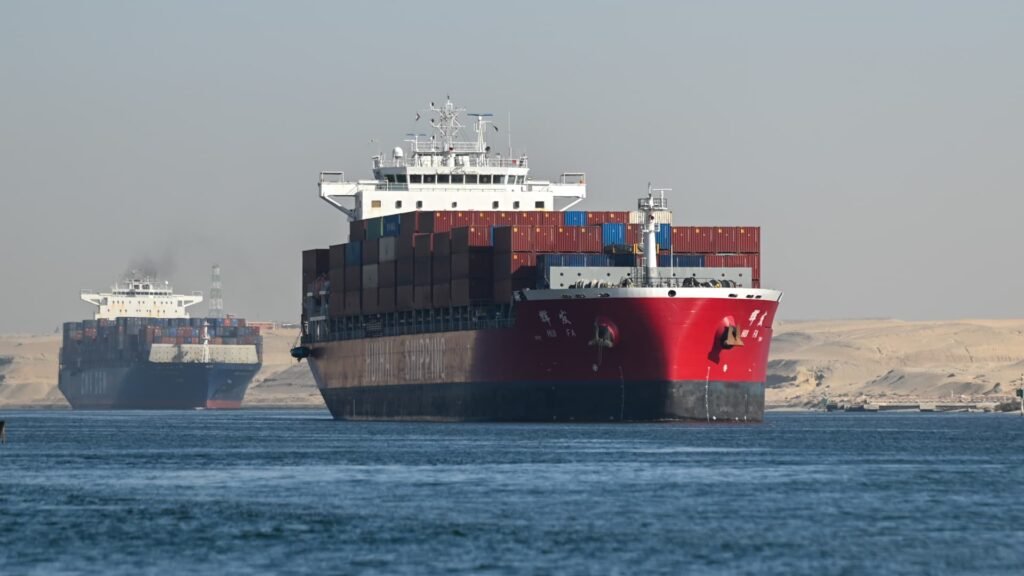Global supply chains are feeling the impact of attacks on ships in the Red Sea by the Iranian-backed Houthis. Freight prices are set to rise on Monday, but transit times across Africa are increasing, causing disruption and delays in the delivery of goods.
Honor Lane Shipping said in an email to customers that the vessel was unable to return to Asia on time and the ocean-going carrier was canceling sailings at short notice.
Spring clothing, footwear, housewares, electronics, patio furniture and pool supplies are just a few of the products on the rerouted vessels. British clothing retailer Next recently warned of stock delays due to prolonged sea transport. In December, IKEA also warned of a crisis in its supply chain due to the impact of the Red Sea.
John Gold, vice president of supply chain at the National Retail Federation, told CNBC that “vessel rerouting is leading to longer transit times and increased costs.” “Unfortunately, the longer the disruption lasts, the more challenges it will pose to ensuring supply chain reliability and efficiency.”
Gold said retailers are working to implement mitigation strategies to avoid further disruption, such as bringing forward major shipping orders or redirecting shipments to the West Coast.
The longer the voyage, the higher the fare.
“This creates a strong incentive for shipping companies to increase rates by imposing General Rate Increases (GRI), Peak Season Surcharges (PSS) and other contingency and emergency surcharges,” the company said. Stated. “HLS warned that the suspension of the Suez Canal route and restrictions on the Panama Canal route could cause trans-Pacific freight rates to soar to their highest since early 2022.”
MSC, the world’s largest shipping company, was the first shipping company to announce rates for late January. Starting Monday, container fees for MSC customers will be $5,000 on U.S. West Coast routes, $6,900 on East Coast routes and $7,300 on Gulf of Mexico routes.
“This is a truly unexpected and significant rate hike,” HLS wrote.
Under U.S. Shipping Law, all shipping companies must give a 30-day notice requirement before imposing surcharges or GRIs, but the Federal Maritime Commission requires that cargo from Asia to the U.S. be shipped around South Africa’s Cape of Good Hope. This is exempted if the route is changed. .
Analysts at Kuehne & Nagel told CNBC that 419 ships are currently rerouting due to the situation in the Red Sea. Using MDS Transmodal’s estimate that the transaction value of a single TEU is $50 million, the total container capacity is 5,650,000 20-foot equivalent units (TEUs, or containers), with a total value of $282.5 billion. Estimated.
According to logistics data firm Project 44, shipping volume through the Suez Canal has fallen by 61% since before the Houthi attack, to an average of 5.8 ships per day. Egypt, which owns and operates the Suez Canal, charges ships between $500,000 and $600,000 for each passage. This is a huge loss for a country already hit by a declining tourism industry and soaring inflation.
Meanwhile, hopes are rising that detour routes around the Horn of Africa will become more stable after Tuesday’s massive attack by the Houthis.
Franziska Wietke, Kuehne + Nagel’s global maritime logistics communications manager, told CNBC on Wednesday: “Currently, most airlines are still completely changing routes, so there are more divisions than before. No,” he said. She said: “The scale of yesterday’s attack is likely to strengthen the position of the world’s airlines that sailing is too dangerous.”
Vessels are now being rerouted on a daily basis, Wietke said.
“The situation is extremely fluid and unstable,” she said.
Logistics companies are also warning customers about container shortages. This is something shippers have not experienced since the coronavirus outbreak. Due to shipping delays, containers are not being placed where they need to be.
Mark Rose, director of marine products for Asia-Pacific at Crane Worldwide Logistics, told CNBC that containers arriving in Europe via the detour will need to return to Asia’s manufacturing hotspot.
“The container shortage caused by the coronavirus pandemic is still fresh in our minds,” Rose said. “The journey from Asia to Europe is just the beginning of an even more turbulent era that could come in 2024.”
Don’t miss the next story from CNBC PRO.




